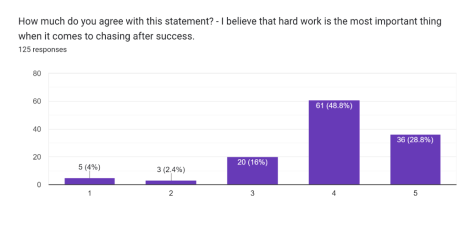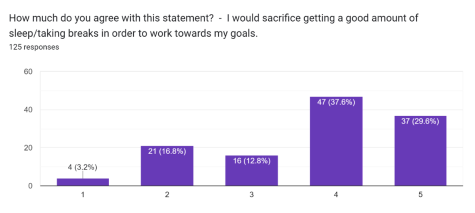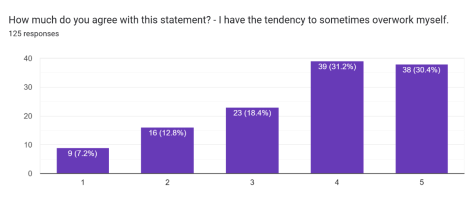Hustle Culture: Ticket to Success or Path to Burnout?
July 16, 2023
Hustle culture, or grind culture, is defined in an article by Forbes as “a mindset that emphasizes working hard and constantly striving for success,” although it “often comes at the expense of one’s personal well-being.” It can exist within certain workplaces or environments, but it can also be promoted through social media, such as with popular hashtags like #RiseAndGrind. The “grind mentality” that hustle culture encourages is often cited as a key to success. However, many people attribute burnout, the feeling of physical and emotional exhaustion, to the constant feeling of needing to work harder brought forth by hustle culture.
BCA students seem to be well acquainted with the mindset of hustle culture, according to the results of a survey that asked students to rank their agreement with various statements on a scale from 1 (completely disagree) to 5 (completely agree). Given the statement “I believe that hard work is the most important thing when it comes to chasing after success,” the majority of students who took the survey (49.2%) ranked the statement at a 4.

Similarly, the majority of students (37.1%) ranked the statement “I would sacrifice getting a good amount of sleep/taking breaks in order to work towards my goals” at a 4 as well. The statement that was the most agreed with was “I have the tendency to sometimes overwork myself”, where 4 was the most common response at 31.5%, and 5 closely followed at 30.6%.


One of the most notable ways pressure from hustle culture arises is regarding study habits. Minjoo Song, a sophomore, remarked on BCA’s rigorous nature and how it can contribute to pressure to study for longer hours. “I think especially at a school like BCA, it’s very easy to feel like you have to do more to feel prepared for exams, projects, or anything.”
Fortunately, students have come up with different ways to combat this pressure. Minjoo uses time-blocking, a strategy where she schedules out her day, hour-by-hour. A benefit to this method is that she is able to designate how much time to spend on each of her tasks, spending more time on subjects that she knows she needs to study more for, and less on subjects she feels confident in. Using this strategy, she is also able to ensure that she incorporates break time into her schedule, which prevents her from overworking herself.
Raj Kangriwala, a junior, discovered a way of reframing his mindset around studying so as not to give in to the demands of hustle culture. For him, the key is self-improvement, not good grades. He grounds himself in the present and not the future, studying with the intention of becoming a better student and a better person with a stronger work ethic. That way, he still ends up reaping the benefits of his hard work without the stress that comes from being overly futureoriented. “I’m working for me,” he emphasized. “Working for good grades, that’s a side thing. It’s not the main goal. The main goal is working for myself, and making me feel better about my work habits, and stuff like that.”
Aside from just study habits, hustle culture can also result in stress regarding more longterm goals. Lukas Tegge, a senior in ATCS, shared his insights on how hustle culture can be detrimental for goals that leave students tunnel-visioned on a specific outcome, such as getting into their dream school.
In particular, he discussed how following a “hustle culture” mindset can backfire if those goals don’t end up working out as expected. “Especially if you don’t have a backup plan, which ‘hustle culture’ doesn’t really provide,” Lukas stressed. “It really hurts you in the long term.”
One way in which the negative effects of hustle culture can begin to harm students is when they compare themselves to others, whether it be to their classmates or to users on social media. “I see my friends studying a lot for assessments and doing a lot of outside-of-school stuff and that makes me feel like I’m falling behind,” Minjoo shared. “Like I have to do as much as them or even more than them.”
Minjoo also believes that the secret to overcoming this is making sure to focus on yourself and not others. “I found that especially more toward extracurriculars, I tend to partake in stuff that I’m personally very passionate and interested in, and I’ve found that it’s a lot easier for me to be motivated. I think that’s why a big thing about avoiding hustle culture is to understand what you like to do. That’s why I’m able to feel more motivated: I’m doing stuff that I’m passionate about.”
In terms of media that promotes hustle culture, the key is to be aware that the lifestyles shown on social media are often only a romanticized version of reality that tends to only show one side of the story. Lukas commented: “I find that social media enforces hustle culture, because you’re seeing all these people and their perfect lives, thinking ‘I need to do more, I just need to push more on these goals.’ It’s gonna work out maybe initially, but long-term, it’s not healthy.”
Despite its negative effects, hustle culture can be a double-edged sword. On one hand, hustle culture helps us achieve a sense of self purpose and instills important qualities like ambition and self-discipline. However, it is important for us to determine the influence we allow it to have on our lives and to channel it in ways that align with our personal needs and goals.
In a productive system, hustle culture can be what keeps the gears “grinding” on. However, if left unchecked, it can also be the catalyst for a total system malfunction.




